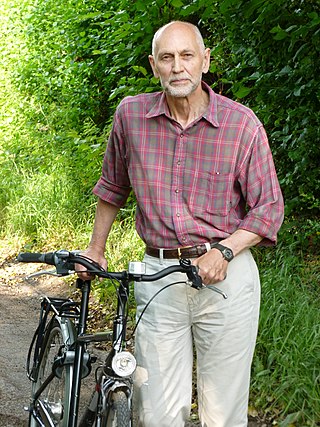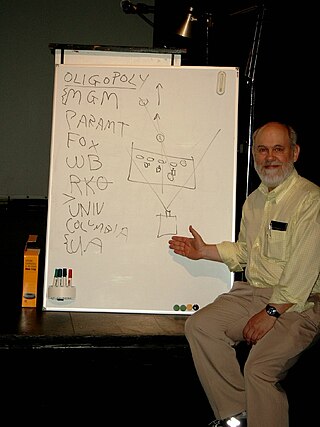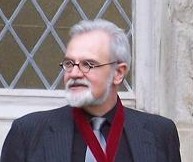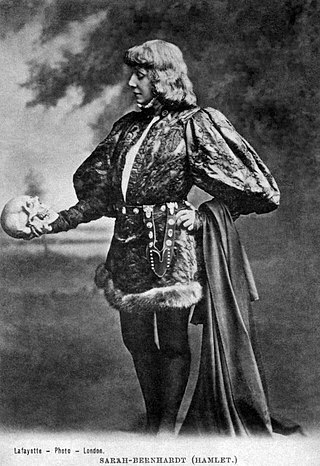Related Research Articles
Aesthetics is the branch of philosophy concerned with the nature of beauty and the nature of taste and, in a broad sense, incorporates the philosophy of art. Aesthetics examines the philosophy of aesthetic value, which is determined by critical judgments of artistic taste; thus, the function of aesthetics is the "critical reflection on art, culture and nature".

Siegfried Kracauer was a German writer, journalist, sociologist, cultural critic, and film theorist. He has sometimes been associated with the Frankfurt School of critical theory. He is notable for arguing that realism is the most important function of cinema.

Gregory Paul Currie FAHA is a British philosopher and academic, known for his work on philosophical aesthetics and the philosophy of mind. Currie is Emeritus Professor of Philosophy at the University of York and Executive Editor of Mind & Language.
Depiction is reference conveyed through pictures. A picture refers to its object through a non-linguistic two-dimensional scheme, and is distinct from writing or notation. A depictive two-dimensional scheme is called a picture plane and may be constructed according to descriptive geometry, where they are usually divided between projections and perspectives.

David Jay Bordwell was an American film theorist and film historian. After receiving his PhD from the University of Iowa in 1973, he wrote more than fifteen volumes on the subject of cinema including Narration in the Fiction Film (1985), Ozu and the Poetics of Cinema (1988), Making Meaning (1989), and On the History of Film Style (1997).
Christopher Janaway is a philosopher and author. He earned degrees from the University of Oxford. Before moving to Southampton in 2005, Janaway taught at the University of Sydney and Birkbeck, University of London. His recent research has been on Arthur Schopenhauer, Friedrich Nietzsche and aesthetics. His 2007 book Beyond Selflessness: Reading Nietzsche's Genealogy focuses on a critical examination of Nietzsche's On the Genealogy of Morals. Janaway currently lectures at the University of Southampton.
Darwinian literary studies is a branch of literary criticism that studies literature in the context of evolution by means of natural selection, including gene-culture coevolution. It represents an emerging trend of neo-Darwinian thought in intellectual disciplines beyond those traditionally considered as evolutionary biology: evolutionary psychology, evolutionary anthropology, behavioral ecology, evolutionary developmental psychology, cognitive psychology, affective neuroscience, behavioural genetics, evolutionary epistemology, and other such disciplines.

Richard Francis Gombrich is a British Indologist and scholar of Sanskrit, Pāli, and Buddhist studies. He was the Boden Professor of Sanskrit at the University of Oxford from 1976 to 2004. He is currently Founder-President of the Oxford Centre for Buddhist Studies. He is a past president of the Pali Text Society (1994–2002) and general editor emeritus of the Clay Sanskrit Library.
Jerrold Levinson is distinguished university professor of philosophy at the University of Maryland, College Park. He is particularly noted for his work on defining art, the aesthetics of music, ontology of art, philosophy of film, interpretation, aesthetics experience, and humour.

Noël Carroll is an American philosopher considered to be one of the leading figures in contemporary philosophy of art. Although Carroll is best known for his work in the philosophy of film, he has also published journalism, works on philosophy of art generally, theory of media, and also philosophy of history. As of 2012, he is a distinguished professor of philosophy at the CUNY Graduate Center.
Kendall Lewis Walton is an American philosopher, the Emeritus Charles Stevenson Collegiate Professor of Philosophy and Professor of Art and Design at the University of Michigan. His work mainly deals with theoretical questions about the arts and issues of philosophy of mind, metaphysics, and philosophy of language. His book Mimesis as Make Believe: On the Foundations of the Representational Arts develops a theory of make-believe and uses it to understand the nature and varieties of representation in the arts. He has also developed an account of photography as transparent, defending the idea that we see through photographs, much as we see through telescopes or mirrors, and written extensively on pictorial representation, fiction and the emotions, the ontological status of fictional entities, the aesthetics of music, metaphor, and aesthetic value.
Linguistic film theory is a form of film theory that studies the aesthetics of films by investigating the concepts and practices that comprise the experience and interpretation of movies.

Vittorio Gallese is professor of Psychobiology at the University of Parma, Italy, and was professor in Experimental Aesthetics at the University of London, UK (2016–2018). He is an expert in neurophysiology, cognitive neuroscience, social neuroscience, and philosophy of mind. Gallese is one of the discoverers of mirror neurons. His research attempts to elucidate the functional organization of brain mechanisms underlying social cognition, including action understanding, empathy, language, mindreading and aesthetic experience.
Stephen John Davies is a Distinguished Professor of philosophy at the University of Auckland, New Zealand. He mainly writes on aesthetics, particularly the philosophy of music but also works on political philosophy. He is a past president of the American Society for Aesthetics (2007–2008), and the New Zealand division of the Australasian Association of Philosophy (2001).

The paradox of fiction, or the paradox of emotional response to fiction, is a philosophical dilemma that questions how people can experience strong emotions to fictional things. The primary question asked is the following: How are people moved by things which do not exist? The paradox draws upon a set of three premises that seem to be true prima facie but upon closer inspection produce a contradiction. Although the emotional experience of fictional things in general has been discussed in philosophy since Plato, the paradox was first suggested by Colin Radford and Michael Weston in their 1975 paper "How Can We Be Moved by the Fate of Anna Karenina?". Since Radford and Weston's original paper, they and others have continued the discussion by giving the problem slightly differing formulations and solutions.

Peter Vaudreuil Lamarque is a British aesthethician and philosopher of art, working in the analytic tradition. Since 2000, he has been a professor of philosophy at the University of York. He is known primarily for his work in philosophy of literature and on the role of emotions in fiction.
Colin Gardner is a British film and media studies theorist living in Shaker Heights, Ohio.
Elizabeth Cowie is a British academic, author, and emeritus professor of film studies at the University of Kent.
Berys Gaut is an author and Professor of Philosophy at the University of St Andrews. He writes on aesthetics, creativity, philosophy of film, and ethics. He was president of the British Society of Aesthetics until 2018.
Jenefer Mary Robinson is an American philosopher, author and emerita professor of philosophy at the University of Cincinnati. She writes on aesthetics, philosophy of psychology, philosophy of mind and theory of emotions. She has published two monographs, one edited collection, and numerous peer reviewed articles. She is on the editorial Board for the Journal of Aesthetics and Art Criticism and was on the editorial board for Notre Dame Philosophical Reviews. She was president of the American Society of Aesthetics from 2009 until 2013. In 2007 she was a Leverhulme visiting professor of philosophy at the University of Nottingham and in 2006 she received a Rieveschl Award for Scholarly and/or Creative Works. She received the National Endowment for the Humanities Fellowship in September 2002. She was interviewed by Hans Maes for his book Conversations on Art and Aesthetics, which also contains her portrait by American photographer Steve Pyke. Debates in Aesthetics, an open access journal published by the British Society of Aesthetics, dedicated Vol. 14 No. 1 to her work.
References
- ↑ University of Kent, School of Arts staff page
- ↑ Aesthetics Research Centre, members page
- ↑ "Works by Murray Smith". Philpapers. Retrieved 19 April 2019.
- ↑ "SCSMI Board of Advisors". The Society for Cognitive Studies of the Moving Image. 11 May 2012. Retrieved 19 April 2019.
- ↑ Editorial board of Screen
- ↑ Editorial Board of the British Journal of Aesthetics
- ↑ Editorial Board of Projections
- ↑ Editorial Board of Series
- ↑ "UCHV Announces 2017–18 Visiting Fellows". University Center for Human Values. Retrieved 19 April 2019.
- ↑ "Murray Smith – From Reflex to Reflection: Experience and Explanation in the Study of Cinema". Kracauer Lectures in Film and Media Theory. Retrieved 19 April 2019.
- ↑ "The Beacon Institute Lecture 2015 by Professor Murray Smith". Youtube. 13 January 2016. Retrieved 19 April 2019.
- ↑ "Is There an Elitism to Valuing Aesthetics?"
- ↑ Smith, Jeff (Summer 1997). "Review: Engaging Characters: Fiction, Emotion, and the Cinema by Murray Smith". Film Quarterly. 50: 52–53. doi:10.2307/1213453. JSTOR 1213453.
- ↑ Pearce, Lynne (1996). "Review: Murray Smith, Engaging Characters: Fiction, Emotion and the Cinema". Screen. 37: 415–418. doi:10.1093/screen/37.4.415.
- ↑ Freeland, Cynthia (2000). "Review: Film Theory and Philosophy by Richard Allen, Murray Smith". The Philosophical Review. 109: 144–147. doi:10.1215/00318108-109-1-144.
- ↑ Levinson, Jerrold (2018). "Review: Film, Art, and the Third Culture Murray Smith". The British Journal of Aesthetics. 58: 336–341. doi:10.1093/aesthj/ayx023.
- ↑ Thomson-Jones, Katherine (2018). "Review: Smith, Murray. Film, Art, and the Third Culture: A Naturalized Aesthetics of Film. Oxford University Press, 2017, xiii + 294 pp., 32 b&w illust., $45.00 cloth". The Journal of Aesthetics and Art Criticism. 76: 356–359. doi:10.1111/jaac.12561. S2CID 191502401.
- ↑ "School history book". 25 February 2016.
- ↑ "Professor Murray Smith, University of Kent" . Retrieved 19 April 2019.
- ↑ "Professor Miri Song School of Social Policy, Sociology and Social Research – Director of Research". University of Kent. Retrieved 19 April 2019.
- ↑ Murray Smith, Engaging Characters: Fiction, Emotion, and the Cinema (Oxford: Clarendon Press, 1995)
- ↑ Murray Smith and Richard Allen (eds), Film Theory and Philosophy (Oxford: Clarendon Press, 1997
- ↑ Murray Smith and Steve Neale (eds), Contemporary Hollywood Cinema (London: Routledge, 1998
- ↑ Murray Smith, Trainspotting (London: BFI Modern Classics, 2002)
- ↑ Murray Smith and Thomas E. Wartenberg (eds), Thinking Through Cinema: Film as Philosophy (Cambridge, MA: Blackwell, 2006)
- ↑ Murray Smith, Film, Art, and the Third Culture: A Naturalized Aesthetics of Film (Oxford: Oxford University Press, 2017)